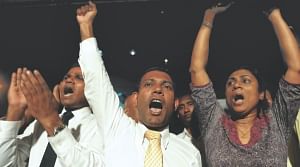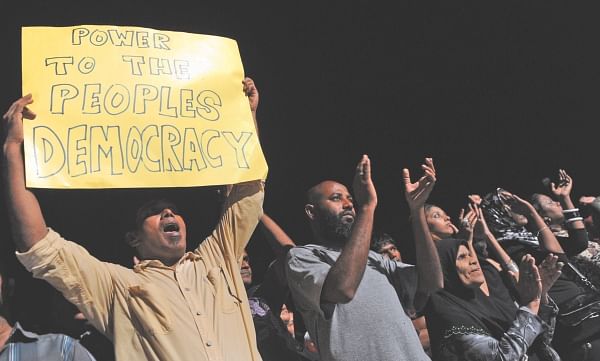| Home - Back Issues - The Team - Contact Us |
 |
| Volume 11 |Issue 07| February 17, 2012 | |
|
|
International Democracy in South Asia Naimul Karim With Mohamed Nasheed's departure, the Maldives has followed the footsteps of several other South Asian nations and has joined the non-admirable list of states in the sub-continent where democracy has been interfered with. Although the country enrolled the virtues of democracy a little more than three years ago, the recent departure of the nation's first ever democratically-elected president adds to the vulnerable situation of the region.
“In the case of the Maldives, it should be of concern to all of us. Mohamed Nasheed got elected through fair elections after many years of dictatorship. The overthrow of the elected government by force should not be acceptable to any of the other South Asian nation that supports democracy,” says Dr Rounaq Jahan, a Bangladeshi political scientists. She further says that the response from democratic nations such as the United States and India was disappointing as they did not support they elected government. Imtiaz Ahmed, professor of International Relations, Dhaka University, blames the departure of Nasheed on the lack of proper democratic institutions in the country. “A nation needs to have democracy in every sphere of society such as the civil society, parliament, within political party, police and army, judiciary etc. Gayoom's rule in the Maldives for the last 30 years has weakened the democratic structure due to the authoritative rule,” he says. Echoing Ahmed's views, Dr Jahan says that for a newly elected democratic government there are several roadblocks. “If you have an opposition on the other side that does not follow democratic norms, then how do you function? That is perhaps what happened with Nasheed. Unless there is a basic agreement among all the parties on the limits of behaviour in democracy, it'll create a problem.” She further says that Nasheed's call for fresh elections after a certain period, a method that was followed by the caretaker government of Bangladesh in 2006 was the right way to go. Comparing the situation of the Maldives to Bangladesh, Ahmed says, “We need a strong structure where political parties have dialogues and where media houses are not owned by business men who influence politics. We need independent bodies.” The Maldives debacle also poses several questions regarding the current position of democracy in South Asia. The ongoing political row between the Pakistani government and its army and judiciary, the recent attempted-coup and the lack of confrontational politics in Bangladesh and Nepal's struggle to maintain a stable political environment are just some of the problems that indicate the growing conflicts in the subcontinent. A report published by the New Delhi-based Centre for the Study of Developing Societies (CSDS) in collaboration with the Department of Sociology, Oxford University, claims that democracy in South Asia faces a foundational challenge of instituting a democratic government that will not be 'undermined by authoritarian challenges.' The report further states that although political parties are an important part of South Asia's political consciousness and generate a high degree of participation their inability to function in a democratic manner or 'offer meaningful choices to voters' has resulted in a low levels of trust.
Analysts state apart from India none of the other nations in the subcontinent have managed to instill a stable form of democracy. “Pakistan has been the worst affected with regular military interventions; Nepal has had its problems with Maoists; the elected government in Sri Lanka has always been restrictive and we had two years of military-backed rule in 2006,” explains Dr Jahan. Furthermore, Dr Jahan has stated her concern for the current situation of democracy in South Asia. “Citizens want a sense of certainty in their political system. People would want to stay in the country only if the system is steady. For that you need stability. Apart from India, despite their troubles, I don't think any other country in the subcontinent feels secure,” she says. Shahab Enam Khan, Assistant Professor, International Relations, Jahangirnagar University, however has a different perspective on the issue. “I am not at all pessimistic when I analyse South Asian democracy,” he claims. Supporting his statement, Khan says that despite all the political problems in Pakistan, democracy, even in its electoral form, continues to exist. With respect to the democratic changes in Nepal, he says that despite the unstable political environment they have still managed to elect a prime minister and stick to democracy. “The problem in South Asia is the quality of democracy which can gradually improve,” says Khan. Supporting Khan's statement, BBCs Pakistani correspondent M Ilyas Khan in a recent report states that the ongoing political row in Pakistan may lead the nation into a stronger parliamentary democracy. Another factor that has adversely affected democracy in South Asia is the strained relations between the nations. According to a report published by The Council on Foreign Relations (CFR), an independent organisation and publisher, instability in South Asia has compelled the countries in the region 'to keep large armies, which, in turn, have undermined democracy.' The report further states 'India, Sri Lanka, Pakistan, and Bangladesh each have long histories of multiparty electoral democracy; however, a few families have dominated political life in all of them.' This often comes to be seen as 'reflecting the will of one powerful personality whose successors view the party as their personal property.' Commenting on the issue of dynastic or family based politics, Dr Jahan says, “The question here would be why the citizens themselves accept this. Political parties have so many groups and factions, that no other leader is accepted. To catch people's vote, parties feel compelled to invoke that name of the supreme leader.” According to Shahab Enam Khan, the dominance of families in the political sector can have both positive and negative outcomes. 'It depends upon the level of contribution,' he says. Stating an example , Khan says that while the Gandhi family in India has played a progressive role in the political system for a long time, a similar system of ruling in Pakistan and Bangladesh have not worked well for the citizens. “If these political families can provide proper things to the public then there is no problem with family politics,” he says. With majority of the democratic nations in the subcontinent going through a rough patch, one wonders if the SAARC democratic charter, which was incidentally signed in the Maldives and is supposed to ensure a democratic society amongst the South Asian nations, is of any use at all. One hopes that the subcontinental nations learn from each other's mistakes and provide the respective citizens with a proper democratic society to live in. Copyright
(R) thedailystar.net 2012 |

